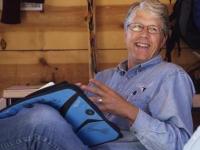Betsy Perry: The Casino
The Ferris wheel circled around and around in the night sky. Canned, monotonous music competed with the cackling laugh from the House of Horrors where a jiggling fat lady tried to lure passerbys into her dark, scary lair.
The sickening, sweet smell of candy covered apples, pink cotton candy and stale, salty popcorn wafted through the warm, summer air. And I was in hog heaven sitting in my metal seat, the bar fastened across me and my grandfather, Tee, looking, as always, distinguished in his imported linen shirt and shorts. He'd drawn the short straw and come with me on my favorite ride. Tee was the affectionate name his grandchildren called him, originating in my 2-year-old attempt to parrot the "Mr. G" my father respectfully called him. Tee/Mr. G was not a "Dad", "Pops" or "Jim." Mr. G, short for Gilliam, was the most familiar my father dared to go.
When we reached the very top of the Ferris wheel, it stopped to let on passengers. This moment, when we stopped high above the ground seemingly half way to the moon, always seemed to last forever. But unlike my mischievous cousins, my grandfather did not maniacally shake the carriage scaring the heck out of my timid young self. Instead, in his soft Southern accent, he pointed out the dots of lights of the freighters drifting through the inky black ocean, the constellations, and way down the beach, lights that might be from our cottage.
This was the best part of my summer — a trip to the Casino in Virginia Beach as our family called this scuzzy, ancient Seaside Amusement Park. There tourists came to stroll, entertain their children and eat bad food. Pimply-faced sailors came to take out their aggression on the bumpy cars or win a stuffed animal by knocking down milk cans for the young girls they'd just picked up.
It was, in reality, a filthy spot with tired old rides held together with chewing gum, operated by scary carnies looking as if they were on their way to or from jail or the drunk tank. But in those pre-TV days of the 1950s, I saw only a bright, exciting world, one that I looked forward to all year long.
This night, we rode on and on, much longer than usual. Had the operator forgotten us? My grandfather — very used to being the boss and clearly ready to disembark — shouted "Stop, stop," as we passed the Ferris wheel operator. But we kept going, on and on, and so it went. Every time we passed him my grandfather in an increasingly imperious tone would yell, "Stop, stop right now!" By now my parents and little sister in her baby blue glasses and bowl hair cut stood near the gate. Their happy smiles and big waves had turned to confusion, perplexity and a little bit of worry.
By now, I was screaming in my loudest five-year-old voice, "Stop, stop, Tee says STOP!" In my sheltered world, if Tee spoke, everyone paid attention. He was bank president, member of countless boards, patriarch of an extended family, beloved and respected by many. Handsome with a perpetual tan, full head of wavy white hair and sparkling blue eyes, he was the picture of a Southern patriarch and not a man to be crossed, particularly by a grinning, half-in-the-bag carny. Obviously this lift operator was having fun with us.
We were causing quite a scene. My father, the courtly English professor, my mother the librarian and my bewildered, frightened little sister were completely out of their element and looked as if they were ready to call the police — or at least recruit a muscular, tattooed sailor to strong-arm the operator. Eventually the operator must've figured he'd had enough fun, slowly lowered us to the ground, unlatched our bar, and released us, "Ya'll had a good time tonight?" he asked menacingly in a voice tempered by a lifetime of cigarettes and whiskey. He grinned as we hobbled away.
Why over a half century later does this incident shine so brightly in my memory when so many other more important ones have faded away? No doubt it was, in part, the shock of my grandfather, who was and still is my hero, being crossed and knocked off the pedestal onto which our family and community had placed him. My safe, little world where there had been absolutes and boundaries had been shaken up. Was it also just the experience of two very different worlds colliding?
Growing up in the south in the 1950s, even at 5, I was accustomed to the daily, interaction of two very different worlds but they were parallel, not colliding, worlds at that time. Or was it an impressionable first glimpse of my powerlessness and my grandfather's, the latter a frightening, unsettling reality. So many years later I have a post-doc PhD in powerlessness, but still struggle to live in that netherworld with acceptance, grace and comfort. I like to think that it was a child's tiny awareness of the unfairness of life, of a certain snobbery that unfortunately we, even my bleeding heart liberal parents and kind, open-minded grandfather, possessed. That in the 1950s the color of your skin (albeit the carny was white), the family into which you were born more often than not determined your path in life. Little would that lift operator know how much thought his action provoked so many decades later.
Betsy Perry was born and raised in Virginia and has been moving slowly north ever since. Before moving to Camden, where she now lives with her husband, Neale, she was an editor at several publishers in New York.
Transformations
We tell stories.
We tell stories to make sense of our lives.
We tell stories to communicate our experience of being alive.
We tell stories in our own distinct voice. Our own unique rhythm and tonality.
Transformations is a weekly story-telling column. The stories are written by community members who are my students. Our stories are about family, love, loss and good times. We hope to make you laugh and cry. Maybe we will convince you to tell your stories.
— Kathrin Seitz, editor, and Cheryl Durbas, co-editor
"Everyone, when they get quiet, when they become desperately honest with themselves, is capable of uttering profound truths. We all derive from the same source. There is no mystery about the origin of things. We are all part of creation, all kings, all poets, all musicians; we have only to open up, only to discover what is already there." — Henry Miller
Kathrin Seitz teaches Method Writing in Rockport, New York City and Florida. She can be reached at kathrin@kathrinseitz.com. Cheryl Durbas is a freelance personal assistant in the Midcoast area. She can be reached at cheryldurbas@tidewater.net.
Event Date
Address
United States
























